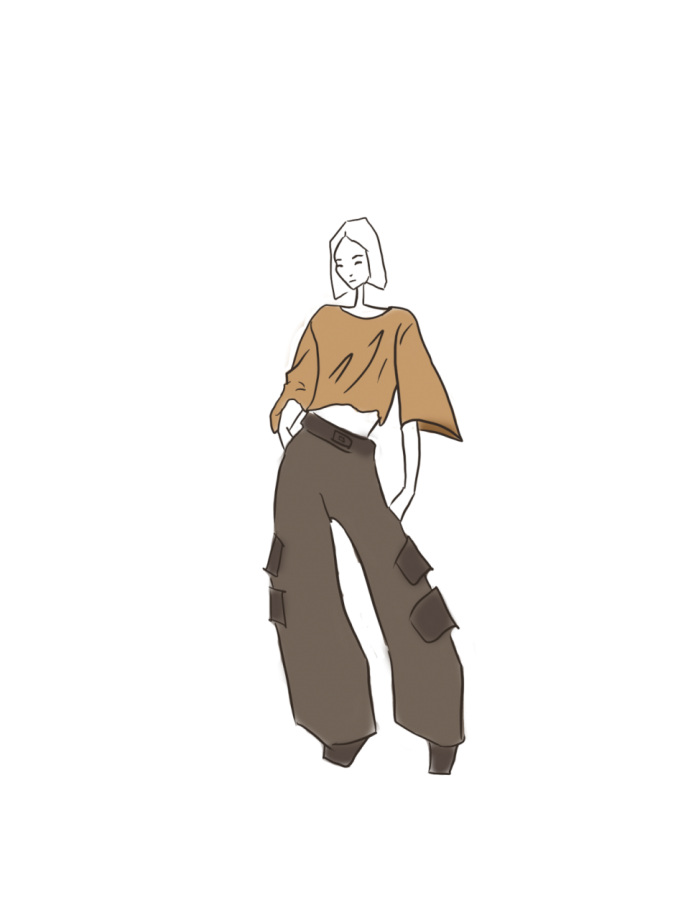Fast fashion may be fun, but with low prices comes low quality. And the planet suffers for it. Art by Lexie Smith
Mass production creates mass destruction
From a series on conscious consumerism
Fast fashion is a term used to describe clothing designs that move quickly from the catwalk to stores to take advantage of trends at the cost of our environment. This business style is heavily apparent in clothing brands like Forever 21, H&M, Zara, Shein, etc. Fast fashion has been a hot topic in recent months due to an increase in the popularity of sustainable and second-hand fashion.
Fast fashion allows for affordable prices on clothing, accessories, etc. Many times, the instant gratification of a five dollar tank top delivered straight to your house is offered digitally, making shopping from bed addicting. Fast fashion’s mainstream appeal caters to all of the microtrends which may be popular at the time. Trends move fast and so does fashion. Microtrends come and go, leading to the discarding of the old clothes purchased to make room for the new trends and latest fashion must-haves.
While being convenient for the buyer, fast fashion poses many issues for the environment and those who participate. Fast fashion is often made possible by the employment of low-wage workers who are given unsafe work conditions. Companies utilizing this manufacturing style exploit workers who are frequently outsourced from less developed countries to produce up-to-date and on-trend appealing fashion for the masses. Not only is fast fashion harmful to workers, but it is also harmful to the environment and our limited resources. The processes used in this style of manufacturing produce extreme amounts of carbon emissions, textile waste, and waste from plastic packaging.
The most impactful waste contribution, however, lies in the industries use of water. According to Earth.org, “The fashion industry is the second largest consumer industry of water, requiring about 700 gallons to produce one cotton shirt and 2,000 gallons of water to produce a pair of jeans.” The sheer amount of water needed to produce every article of clothing globally is even harder to quantify or picture. Most of that water also ends up in streams or ditches, because of textile dyes polluting it past the point of consumption or reuse.
As fast fashion increases the occurrence of production, it also increases pollution in our water, land, and air. It’s not hard to see why, according to the Princeton Student Climate Initiative, “The fashion industry is currently responsible for more annual carbon emissions than all international flights and maritime shipping combined.”
Despite its environmental impact, the popularity of fast fashion has created a sense of disposability in the minds of many teens and young adults today.
Many people will spend money on a “Shein haul” to fit the latest Tik Tok or Instagram and Pinterest trends but end up donating or throwing them away after the trend has ended. Lots of these clothes will end up in landfills or thrift stores. Regan Wittstruck, a Goodwill employee and senior at Millard South had lots to say about fast fashion in the thrift world. “We can only take in so many donations at the Goodwill. This means that the more clothes that you donate of low quality, we have less room for good clothes that we can take for those who need them.”
The appeal of fast fashion is widely understandable. However, in recent years, there’s been a rise in consumer support for small businesses, ethical fashion, and second-hand clothing. These options are better for not only the consumer but also the environment. Including things like recycled materials in the product itself and/or in packaging and the appeal of ethically sourced products has caused a more recent boom in the popularity of small businesses, ethically sourced or “green” companies.
Environmental and climate concerns have peaked in 2021 with the release of a new climate report noting that current efforts to stop global warming aren’t enough. People have scrambled to lessen their individual impact on the globe and rallied against fast fashion corporations. If the industry maintains its course, an increase of 50% in greenhouse gas emissions is expected within a decade.
Companies like SHEIN and Urban Outfitters have done little in recent years to improve their production and distribution. Chinese brand SHEIN, adds 500 products to its website each day, at very cheap prices. Customers do not have access to information about the brand’s supply chain and where its suppliers are located
In complete contrast many companies have tried to move to more affordable prices and items that are more planet friendly. Fabletics, an athletic company by Kate Hudson, makes quality products that are more budget friendly. With bundles starting at fifty dollars, people are more willing to pay for the quality. This same company has a line of leggings that are biodegradable after 10 years, which can please those who are looking for that eco-friendly edge.
More companies are following this path by creating products that With have eco-friendly materials and promote them as biodegradable. Although some companies are taking this important leap, there are not enough of them to truly make an impact. All of these big name brands aren’t making the strides they need to truly make a difference. Fast fashion, although fun to participate in, is a highly dangerous game companies are playing. From creating outrageous shopping standards (low price/low quality), to harming our environment; fast fashion has got to go. Become an informed consumer and help do your part to lower these standards and help save the planet and your wallets.
